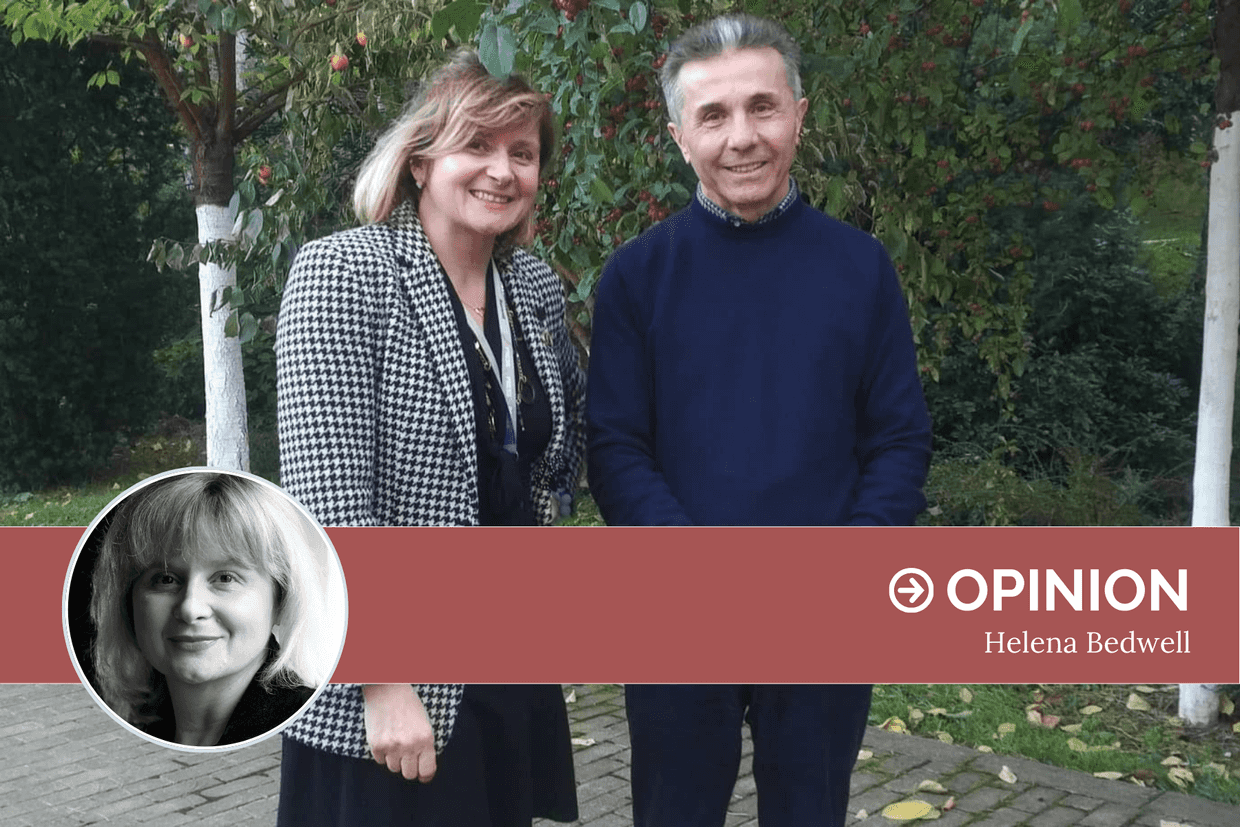
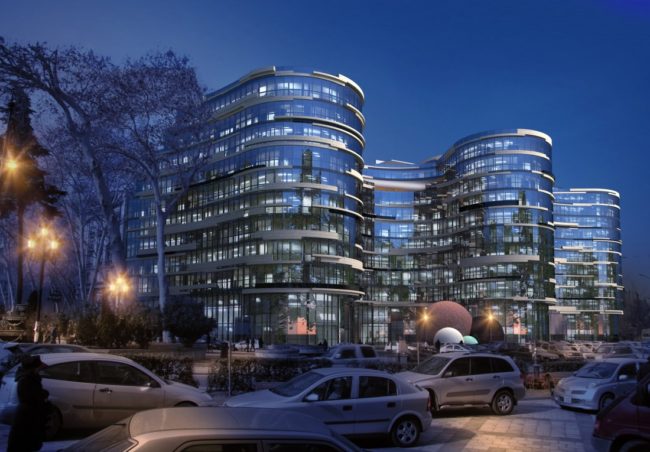
 Tbilisi city authorities have come under fire for a recent decision to privatise a plot of land in central Tbilisi. The sale was for just ₾1 ($0.40), to a company connected to Georgia’s wealthiest, and perhaps most influential person — billionaire ex–Prime Minister Bidzina Ivanishvili.
Tbilisi city authorities have come under fire for a recent decision to privatise a plot of land in central Tbilisi. The sale was for just ₾1 ($0.40), to a company connected to Georgia’s wealthiest, and perhaps most influential person — billionaire ex–Prime Minister Bidzina Ivanishvili.
A hotel car park
Approximately 1,900 square metres of land behind Pushkin Square, adjacent to Tbilisi’s Freedom Square, is currently being used as a temporary car park, where minibuses stop for few seconds to let out passengers. Despite the area usually being full of cars, it also creates a passage connecting the main Rustaveli Avenue to Lado Gudiashvili Street.
The area lies in front of a hotel construction site, part of the controversial Panorama Tbilisi project. This massive project is being implemented by the private $6 billion Co-investment Fund, which was presented in 2013 by then–Prime Minister Bidzina Ivanishvili. Ivanishvili pledged an additional $1 billion of his own money to the project.
[Read: Tbilisi’s Panorama project is urban boosterism at its worst]
The company building the hotel is Tbilisi City Ltd, a subcontractor of the Co-investment Fund. The company sought to buy the land in front of the hotel to build an underground car park, but it was classified a ‘landscape-recreational zone’, meaning it could not be privatised.
From landscape-recreational zone to a car park
The authorities in Tbilisi moved to change this; to rezone the site so it could be given away.
A joint sitting of Tbilisi City Assembly’s (sakrebulo) Environmental Protection and Urban Planning commissions was held on 29 September to discuss the issue before a vote to approve the rezoning would be held.
Shorena Bukhrashvili, chair of the Environmental Commission, challenged the City Hall’s Architecture Service as to whether a geological evaluation, which is necessary before approving construction, had been carried out on the site, according to InterPressNews.
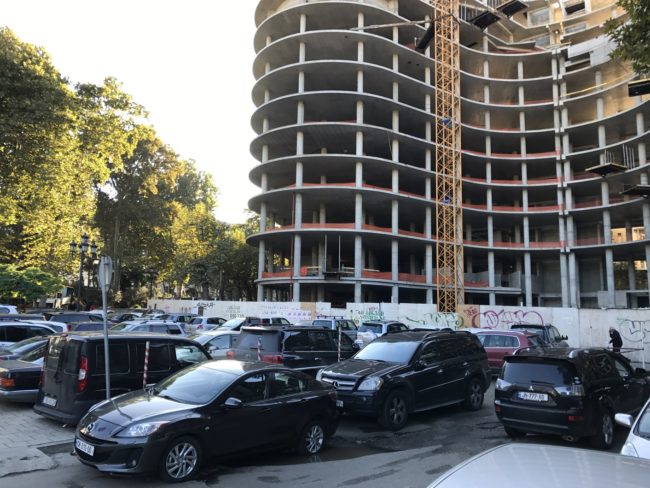
Giorgi Tkemaladze, Deputy chair of the City Assembly, said the session was about the rezoning of the land, not any construction, claiming it was not necessary to present an evaluation.
Gocha Babunashvili, head of the Urban Planning Commission, said a geological evaluation had already been carried out for the construction of the ‘220-room hotel’, and that this would suffice.
In the end, the City Assembly agreed to rezone the land. Twenty-five assembly members voted in favour of the move, while only three voted against it. Four opposition members boycotted the vote.
After the status of the land was changed, Tbilisi City Hall awarded the land to Tbilisi City Ltd on 4 October. On 10 October, the City Assembly approved the transfer.
The land was sold for the symbolic price of ₾1, but the company was obliged to construct the underground car park and invest more than ₾1 million ($400,000) in the property over the next 12 months.
Public backlash
The decision-making process has been accompanied by waves of protest from several political parties and activist groups. Opposition parties the United National Movement (UNM), European Georgia, the Republicans, and others, have held demonstrations in front of the City Assembly and City Hall.
When the City Assembly met on 10 October to approve the City Hall’s decision, dozens gathered outside to protest. UNM leader Nika Melia, an MP and mayoral candidate in 2014, tried to enter the building but was denied entry by the security and police. Clashes broke out and eight people were detained.
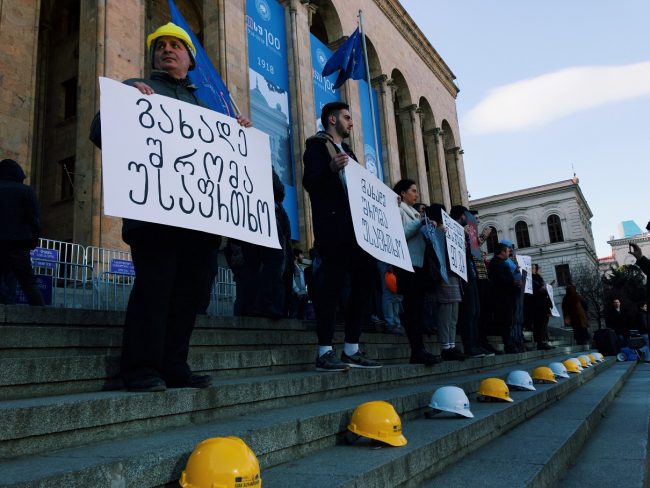
Roughly 200 officers mobilised around all three entrances to the building, preventing anyone other than journalists and assembly members to attend the sitting, after a decision was made to close the session.
A number of civil society groups and local activists were also present at the protests. On 29 September, activists from environmental movement Guerrilla Gardening Tbilisi tried to attend the assembly sitting, but were removed from the building.
‘We will not let you buy our city’, protesters shouted.
Buying property for symbolic price
‘We are facing a reality where there is not a single place in the country which cannot be bought by a multi-billionaire’, Mariam Bakradze, an architect with Guerrilla Gardening, told OC Media.
‘People with large amounts of money and influence can easily privatise public spaces, and this has been going on for years — all the political elites have been doing this’, Bakradze said, adding that this is an ‘ill-practice, where public opinion is not considered’.
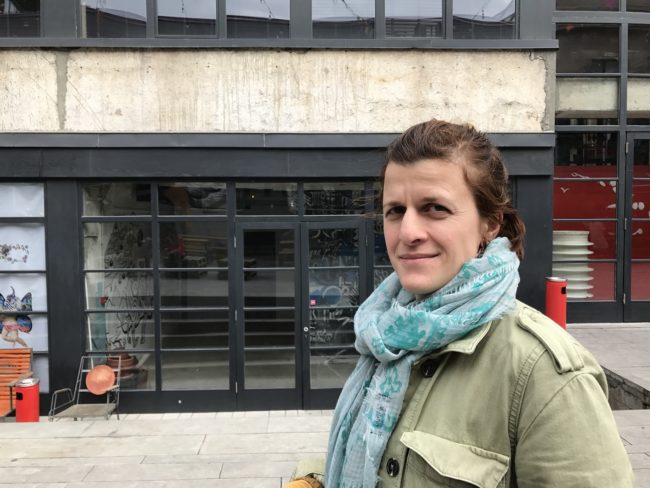
Bakradze says the current decision is a symptom of two inseparable problems. The privatisation of public spaces in general, and that this happens for ₾1.
Indeed, the practice of privatising land for a symbolic price is far from a new phenomena. Anti-corruption group Transparency International — Georgia (TI) has documented the practice throughout the country. For example, a July 2017 research paper by TI records 23 such giveaways by authorities in the Autonomous Republic of Adjara between 2013–2017.
According to another recent report from TI, Tbilisi authorities alone have privatised government assets via a ‘direct sale’ method several times since 2014. Property is sold to a specific buyer for a symbolic sum in return for commitments by the purchaser to invest in the purchased property.
According to the report, the City Assembly granted City Hall consent to privatise state property 58 times over the last three years. The Georgian Orthodox Church was received property for just ₾1 in 28 of these cases.
TI says the decision-making process in these transfers has been opaque and decisions are not properly justified.
‘Frequently, politicians justify this kind of property transfers by, I would say, a neoliberal argument — as if it’s in the “public interest” that more investments come, which will benefit the population. In this case, they claim that the parking will be beneficial, but in reality, this car park will not be an open public space, but a car park for the private hotel, inaccessible for ordinary people’, Bakradze said.
Not only the centre of the city
Along with the land behind Pushkin Square, the City Assembly has voted to sell approximately 4,450 square metres of land on the Tabori Mountain, on the city’s outskirts, to another subcontractor of the Co-investment Fund, Tabori Resorts Ltd. This time the sale was for the land’s market price; the company will pay ₾102,000 ($41,000).
On 29 September, Tbilisi City Assembly changed the zonal status of 4,700 square meters of land to allow the company to develop it. The land is next to the company’s current property — over 30 hectares of land where a golf course and five-star hotel are being developed — according to the Georgian Young Lawyers’ Association (GYLA).
The newly acquired land will be used for a drainage system. GYLA had urged the City Assembly not to sell the land to the company, as the project will interfere with Tbilisi’s historic protected landscape zone.
Who are the companies?
Both Tabori Resorts Ltd and Tbilisi City Ltd belong to Georgia’s Tourism Development Fund. The director of both companies is Irakli Karseladze, who also serves as chair of the supervisory board of the Co-investment Fund.
Georgia’s Tourism Development Fund, headed by Karseladze, is owned by Frankston International S A, registered in tax haven Panama.
The Fund was given the go-ahead to develop eight projects totalling $680 million in Georgia by its parent company, the Co-investment Fund. The Co-investment Fund said in 2016 ‘the number of projects required the existence of a separate target fund’.
What’s next?
Transparency group the International Society for Fair Elections and Democracy (ISFED) said on 10 October the decision of Giorgi Alibegashvili, the head of the City Assembly, to partially close the assembly session was illegal.
According to ISFED, the City Assembly had not decided to close the session beforehand, and Alibegashvili does not have the authority to make that decision single-handedly.
When challenged by journalists, Alibegashvili could not name an exact act or law according to which he refused citizens entry. He claimed that the opposition ‘had announced a number of times that they aimed to thwart the Assembly Sitting. They have been announcing this openly, in front of the public. We will not let them violate the law’, he added.
According to ISFED, if the case is appealed in court, the City Assembly’s decision to grant the land could be annulled.


